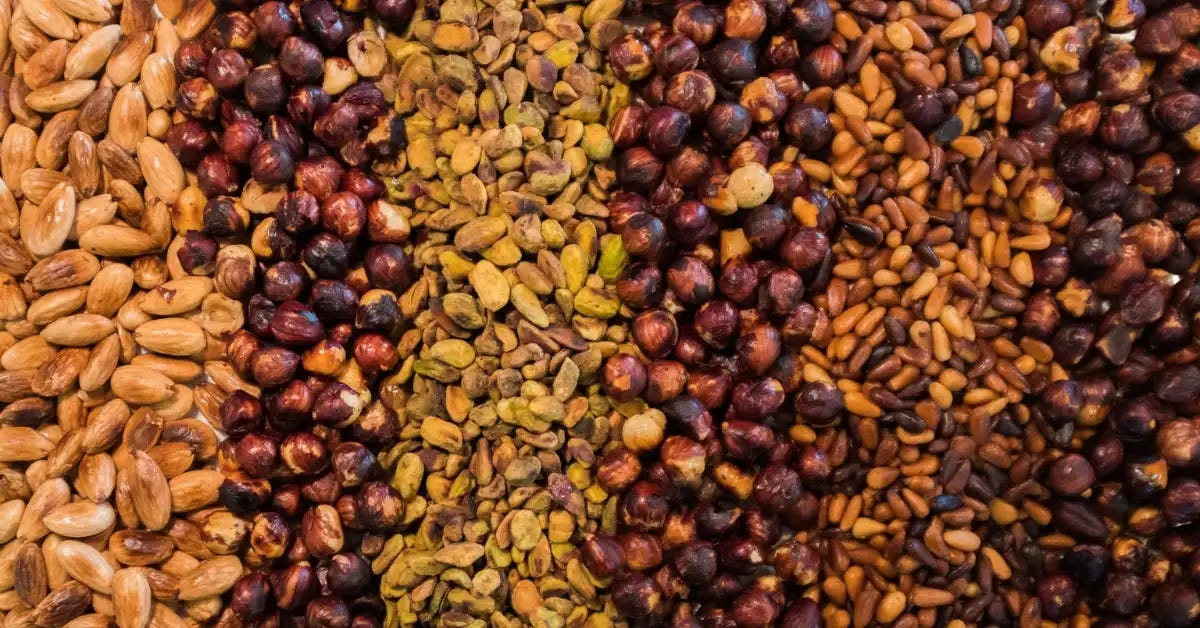Unveiling the Nutty Truth: Exploring Health Benefits of Nuts
Twenty grams of nuts a day--that's it? That's about 40 peanuts or 15 almonds or a little more than an airline package of nuts. I was surprised that the benefit of eating nuts caps out at about a small handful per day. I spent a year as a vegan, and I remember eating a lot more than a small handful of nuts as I looked for replacements for the animal products I had been eating before. My first question for my nut research was whether I could bulk up the small handfuls over a week and get the same benefit by eating 140 grams of nuts on the weekend. Unfortunately, the answer is nope. Over 3 million years of people follow-ups, they found that people eating nuts over five times a week reduced their all-cause mortality by over twice that of people who ate nuts just once a week. Association of Nut Consumption with Total and Cause-Specific Mortality | NEJM1
Oh well. It looks like I get to measure out 20 grams of nuts every morning for my oatmeal!
Another question I had was whether nuts are better or worse than the others. Unfortunately, it doesn't look like there's enough data between people eating different kinds of nuts to see health differences, except one nut that is not a nut--the peanut. It is more like a pea, a hardened legume, or a bean. Because of this distinction, or perhaps because it's the most popular nut despite not being one, some studies separate peanuts and peanut butter from all other nuts.
I'm afraid this isolation doesn't help the peanut. Nuts, excluding the peanut, were nearly twice as healthy in regards to all-cause mortality as peanuts, and peanut butter was even a little less healthy than peanuts. Although close, the difference in health benefits between nuts and peanuts or peanut butter didn't reach statistical significance. Prospective Evaluation of the Association of Nut/Peanut Consumption With Total and Cause-Specific Mortality.2
For optimal longevity, eat 20 grams of non-peanuts nuts every day.
FAQs
Q: How much nuts should I consume daily for optimal health?
A: The recommended daily intake of nuts is about 20 grams, equivalent to approximately 40 peanuts or 15 almonds. Studies have shown that this modest portion size provides the health benefits of nuts.
Q: Can I consume a larger quantity of nuts on the weekends instead of small daily portions?
A: Unfortunately, consuming a larger quantity of nuts on weekends to compensate for smaller daily portions does not yield the same health benefits of nuts. Consistency in nut consumption is key for maximizing the associated positive effects.
Q: Are there differences in health benefits among different types of nuts?
A: While there is limited data comparing various types of nuts, peanuts (which are actually legumes) have been separated from other nuts in some studies. The research suggests that nuts, excluding peanuts, may be nearly twice as beneficial in terms of all-cause mortality.
Q: Is it necessary to measure out 20 grams of nuts every day?
A: The observational studies are based on reported intake of nuts, so it's unlikely that taking a little more or less makes a big difference. 20 grams is a small handful of nuts, so grabbing a small handful daily is a practical way to ensure you are consuming the recommended amount. The important part is to make eating nuts a daily habit.
Q: Can nuts be a part of a vegan diet?
A: Absolutely! Nuts are a valuable source of plant-based protein, healthy fats, and various nutrients. They can be an excellent addition to a vegan diet and there are a range of health benefits of nuts when consumed in moderation.
Q: Can I consume nut butter instead of whole nuts?
A: Nut butter, such as almond butter or cashew butter, can be a convenient and delicious alternative to whole nuts. However, it is important to choose natural nut butter without added sugars or unhealthy additives. Moderation is key, as nut butter is dense in calories.
Q: Can nuts help with weight management?
A: Despite being calorie-dense, the health benefits of nuts include weight management when consumed in moderation. They are rich in fiber, protein, and healthy fats, which contribute to satiety and may help control appetite. However, portion control is essential to avoid excess calorie intake.
Q: Are roasted nuts as healthy as raw nuts?
A: Raw nuts are generally considered the healthiest option because they retain their natural nutrients and healthy fats. Roasted nuts may undergo some nutrient loss due to the heating process, and certain methods of roasting can add unhealthy oils or excessive salt. If choosing roasted nuts, opt for those with minimal added ingredients.
Q: Can nuts be included in a low-carb or ketogenic diet?
A: Yes, nuts can be a valuable part of a low-carb or ketogenic diet due to their high fat and low carbohydrate content. They provide a good source of energy and contribute to feelings of fullness. However, it is important to consider the portion size and select nuts with lower carbohydrate content, such as macadamia nuts or pecans.
Q: What are the specific health benefits of nuts?
A: Nuts offer numerous health benefits. They are associated with a reduced risk of cardiovascular diseases, improved cholesterol levels, better blood sugar control, and increased antioxidant intake. Additionally, their nutrient profile supports brain health, bone health, and overall well-being.



